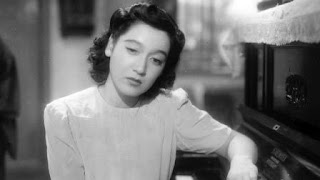The story opens in 1933 as Japan's increasingly nationalist regime moves to suppress academic freedom and student activism in the period before World War II. Yukie (Setsuko Hara) the daughter of a university law professor, soon sees her life change dramatically. Two proteges of her father (Noge and Itokawa), vie for her attentions. When the father is fired, the two join other disgruntled students in a resistant movement that the minister of education easily and quickly controls. Noge drops out of school to continue his political dissent, while Itokawa chooses a safe path and graduates, becoming a government prosecutor and member of the establishment. But the story is about the girl, and what decisions she makes to bring meaning and purpose to her life.
Dissatisfied and empty, Yukie moves to Tokyo where she secures one meaningless job after another. She eventually meets Noge there, who is a recent parolee after five years in prison for political opposition to Japan's designs for expansion and war. Now a publisher, he continues his dissident ways in secret. The two marry. He tells her that one must have no regrets in life, to pursue a course that is important. If the people of today do not understand his opposition to the government, they will in ten years. On the eve of Pearl Harbor, Noge is arrested. He later dies in jail, leaving Yukie again, unfulfilled and searching for a purpose.
 |
| Idyllic days before academic freedom was oppressed. |
Viewers used to Kurosawa will find this a different film than his usual fare. Most obviously, it is centered on a woman rather than a male character. It contains no action to speak of and none of the Fordian themes of honor, loyalty, betrayal and revenge that inhabit his later films. (Kurasawa was a great admirer of John Ford and his cinematic approach to story telling.) Like his later work, however; No Regrets is beautifully shot. The lack of a strong male protagonist allows the director to focus on character development and performance.
Hara is remarkable. One of the world's great actresses, she is just 26 here, but demonstrates more skill and controlled emotion than just about any better known American and European actors (The only comparable ones for me are Stanwyck and Kerr). The film spans some 12 years of the character's life, and at no point does she not look or act the correct age. It is a turbulent journey of self-discovery, handled sublimely. She looks quite younger here than she did for the Noriko Trilogy roles with Yasujiro Ozu; fuller of face perhaps, with shorter hair, but still beautiful. Kurosawa uses plenty of closeups of his actress to great effect, as Hara's eyes convey an enormous range of feelings, from joy to despair.
When one thinks about her more famous "Noriko" performances: self-effacing young women still steeped in tradition; and compare them to her role as the passionate, tradition-breaking Yukie; you appreciate that Hara was a wonderfully versatile actor.
The best scenes are in the final third, when Yukie has decided to travel alone to the country to live with Noge's parents. They live a miserable life, are old and dirt poor, and have been ostracized by the villagers for having a traitor for a son. At first they reject her, but her stubborn determination to help someone eventually wins them over. She stands alongside the old women planting rice and toiling in the fields, and you get a little appreciation of the back-breaking life that an agriculture-based existence could be in Japan in the 1940s.
 |
| Setsuka Hara as Yukie. |
Made just after the war, it is Kurasawa's first film not censured or controlled by the state. It is interesting that he includes no real mention of the conflict. It intrudes into the lives of his characters off-screen. Though there is a clear rejection on the director's part of Japan's role in the war, and of the philosophy of expansion that its jingoistic leaders embraced, he does not dwell on it. This is a more subtle, sensitive film than a lesser director might have made in his place.
I like a film bookended by related scenes. No Regrets has one of films' finest examples. It opens with a perfectly idyllic scene. Yukie and a group of college students are on a picnic. They happily bound through a flowered meadow, step across rocks in a stream, and run through some woods to the top a hill where a panoramic view unfolds. There they collapse in the grass and rest. Gunfire is heard in the distance. Yukie walks off for a better look, saying she likes the sound. They find a body in the grass. This signifies the start of the oppressive period. Near the end of the film, Yukie revisits the spot, and sits near the same stream to watch a similar group of students. They enjoy the reinstated freedoms. It is a poignant reminder that life comes full circle and that she has come a long way.
No comments:
Post a Comment